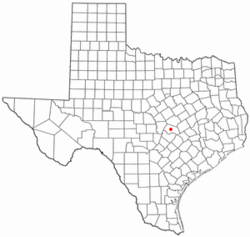Georgetown, Texas
| Georgetown, Texas | |
|---|---|
| City | |
| Nickname(s): Red Poppy Capital of Texas, Retirement Capital of Texas, Gtown | |
| Motto: "Sincerely Yours" | |
 Location of Georgetown, Texas |
|
 |
|
| Coordinates: 30°39′4″N 97°40′53″W / 30.65111°N 97.68139°WCoordinates: 30°39′4″N 97°40′53″W / 30.65111°N 97.68139°W | |
| Country | United States |
| State | Texas |
| County | Williamson |
| Settled | 1840s |
| Incorporated | 1848 |
| Government | |
| • Type | Council-Manager |
| • Mayor | Dale Ross |
| • City Manager | David Morgan |
| Area | |
| • Total | 54.3 sq mi (141 km2) |
| • Land | 52.1 sq mi (135 km2) |
| • Water | 2.3 sq mi (6 km2) |
| Elevation | 755 ft (230 m) |
| Population (2014) | |
| • Total | 55,716 |
| • Density | 1,000/sq mi (400/km2) |
| Time zone | Central (CST) (UTC-6) |
| • Summer (DST) | CDT (UTC-5) |
| ZIP codes | 78626, 78627, 78628, 78633 |
| Area code(s) | 512 & 737 |
| FIPS code | 48-29336 |
| GNIS feature ID | 1357960 |
| Website | Georgetown.org |
Georgetown is a city in and the county seat of Williamson County, Texas, United States, with a population of 47400 at the 2010 census and a population of 63,716 at the 2016 Census Estimate.
It is 30 miles from Austin. Southwestern University, the oldest university in Texas, was founded in 1840 and is located in Georgetown about one-half mile from the historic square. Sun City Texas is a large retirement-oriented and age-restricted development that constitutes more than one-third of Georgetown's population.
Georgetown has a notable range of Victorian commercial and residential architecture. In 1976, a local historic ordinance was passed to recognize and protect the significance of the historic central business district, and in 1977, the Williamson County Courthouse Historical District, containing some 46 contributing structures, was listed on the National Register of Historic Places. Georgetown is also known as the "Red Poppy" Capital of Texas for the red poppy (Papaver rhoeas) wildflowers planted throughout the city. Georgetown's Red Poppy Festival, which attracts up to 30,000 visitors annually, is held in April each year on the historic square.
Georgetown has been the site of human habitation since at least 9,000 B.C., and possibly considerably before that. The earliest known inhabitants of the county, during the late Pleistocene (Ice Age), can be linked to the Clovis culture, a Paleo-Indian culture characterized by the manufacture of distinctive "Clovis points." that first appeared around 9200 B.C., and possibly as early as 11,500 B.C., at the end of the last glacial period. One of the most important discoveries in recent times is that of the ancient skeletal remains dubbed "The Leanderthal Lady" because of its age and proximity to nearby community Leander, Texas. The site is immediately southwest of Georgetown and was discovered by accident by Texas Department of Transportation workers while core samples for a new highway were being drilled. The site has been extensively studied for many years, and samples carbon date the findings to the period, approximately 10,500 years ago (8500 BC). Archeological dig sites showing a much greater evidence of Archaic Period inhabitants have been found in burned rock middens at several sites along the San Gabriel that are now inundated by Granger Lake and at the confluence of the North and South San Gabriel Rivers in Georgetown.
...
Wikipedia
